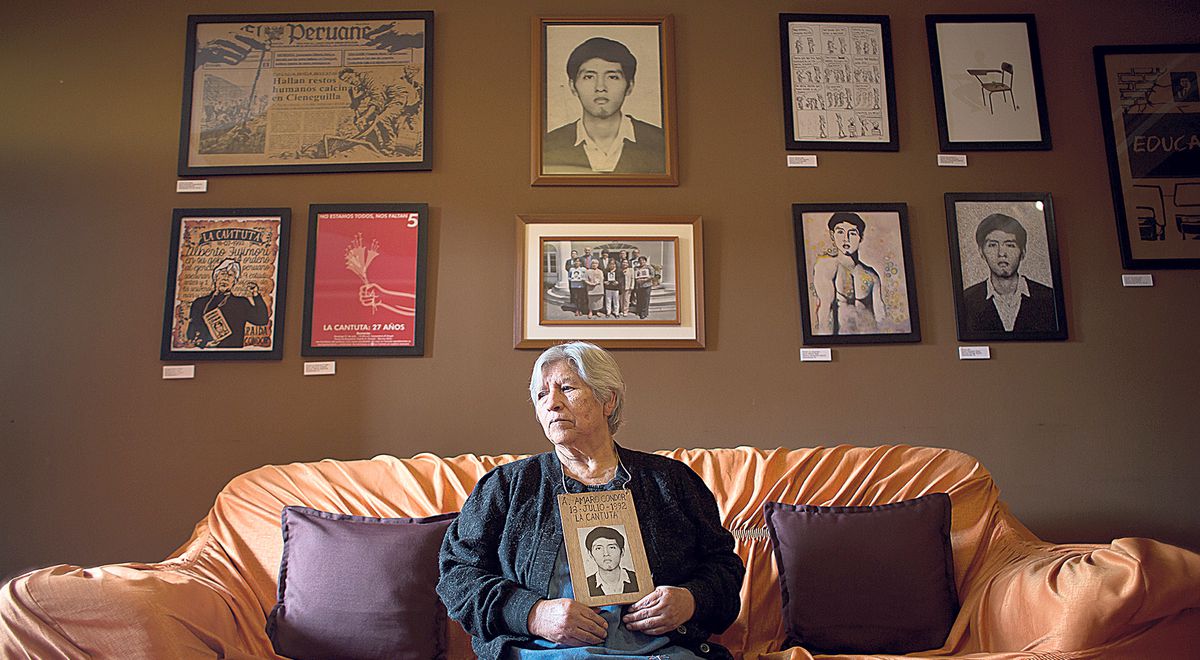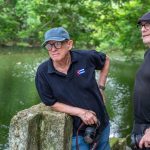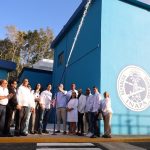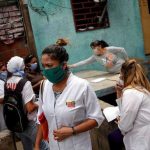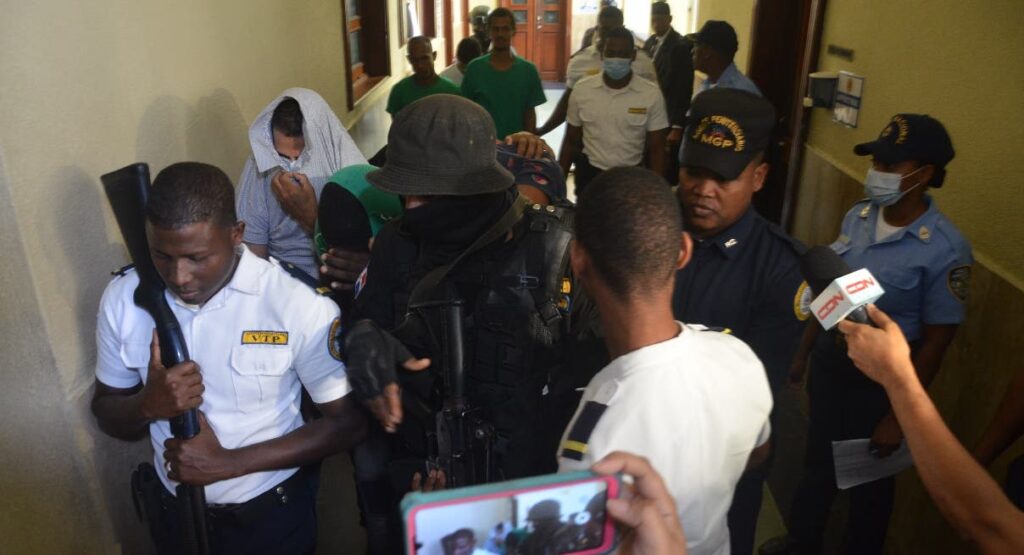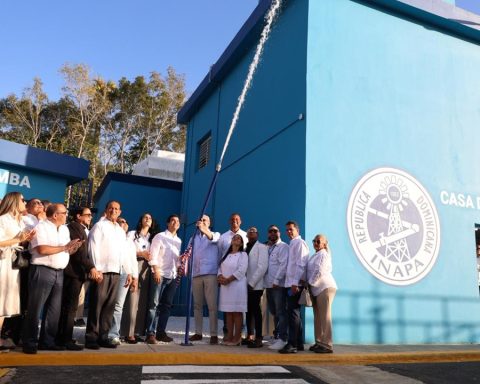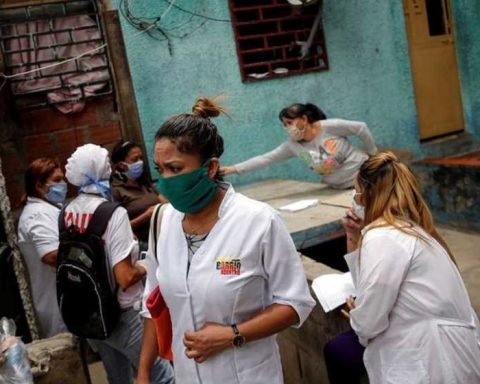Raida Cóndor has spent the last 30 years searching for her son Armando. He was 25 years old when members of the Colina military detachment kidnapped him, along with eight other young people and a teacher. of the La Cantuta University. Since that day she started walking and knocking on hundreds of doors to find him, but until now she has not been able to find him.
“Five students are still missing, including my son. I hope we can find him now.” He says with some enthusiasm, since the Prosecutor’s Office has planned to carry out an exhumation this month in Cieneguilla, where in 1993 burned remains and two sets of keys were found, one of which belonged to his son.
Dora Oyague Fierro (21), Armando Amaro Cóndor (25), Felipe Flores Chipana (25), Heráclides Pablo Meza (28), Robert Teodoro Espinoza (24). Photo: composition/The Republic
He always has his photo hanging around his neck, in his wallet, in his room. The living room of his house is full of portraits and paintings by Armando that are part of a memory project in the homes of relatives of the victims of political violence.
YOU CAN SEE: Ortiz: The relatives of the victims of the Alberto Fujimori regime do not act out of hatred
He remembers that the last day he saw him, he was going to La Cantuta, where he was studying Electronics, carrying a backpack and his zampoña. He left promising to return on Wednesday, but seconds later he returned. “I told him: what happened, dad? He replied: Nothing, I’ve come back to say goodbye. He hugged me tight and left, ”says Raida with a broken voice.
The next thing he knew, from a college classmate of his son, was that On the morning of July 18, 1992, they had taken him out of the residence along with other students. Since then, Raida has not stopped looking for him in the midst of his pain, overcoming his tiredness.
“I went to the Dincote, but I couldn’t find it. To the police station, to the hospital, and nothing. I arrived at the university and went to the room where he slept. I sat on his bed and when I bent down I saw his glasses, his shoes and the lock we had bought. I picked them up and took them to my house, ”she specifies.
In the cantuta He met the relatives of the other hostages, with whom he began the search. “What were we going to find them if that same morning they were murdered!”, She says sadly.
YOU CAN SEE: Alberto Fujimori is convicted of crimes against humanity, affirms Carlos Rivera
The first year I hoped to see him alive again. He thought that he could be detained somewhere and that at some point he would be released. But she couldn’t be calm. “There were nights when he would throw me on the floor, thinking that maybe he would be sleeping on the floor. Then he dreamed it and said to me: what are you doing like this? And I answered him: waiting for you to arrive”, says Raida, who has been recognized as the mother of the Bicentennial for her tireless search.
Cieneguilla Trenches
In July 1993, a congressional investigative commission was formed to investigate the La Cantuta case. Its president, parliamentarian Roger Cáceres, received an envelope with a sketch of four pits in the Chavilca ravine, Cieneguilla; there were also some charred bones.
Only two of these burial sites were exhumed, where hair, bone fragments and burnt pieces of cloth were found. They also found two sets of keys, in one of them was the one that fit the padlock that Raida picked up in the bedroom where Armando was taken from. Another key opened the gate and the door of his house in the jirón Italia, La Victoria. But he couldn’t save even that, because he remained as evidence in the Judicial Power, where he ended up getting lost.
YOU CAN SEE: Relatives of Fujimori’s victims ask the Inter-American Court to issue provisional measures
“That day I knew that Armando was not going to come back, that they had killed him. The world fell on me, ”he says. He has red eyes filled with tears held back for years.
Test. In Cieneguilla they found the keys of two students. Photo: diffusion
Four months later, on land belonging to Sedapal, in Huachipa, which overlooks the Ramiro Prialé road, They exhumed a complete body, which turned out to be that of Luis Enrique Ortiz Perea, as well as a skull, and two feet in quicklime, among other remains.
In the end, it was also possible to identify Professor Hugo Muñoz and students Bertila Lozano, Juan Mariños, Marcelino Rosales. Nevertheless, It has not yet been possible to find anything about Armando Amaro Cóndor, Dora Oyague Fierro, Heráclides Pablo Meza, Robert Teodoro Espinoza and Felipe Flores Chipana.
YOU CAN SEE: Director of Aprodeh denounces impunity of former members of Grupo Colina
Carmen Oyague raised her niece Dora since she was four years old. She grew up with her children, as if they were brothers.
“I never imagined losing her like this. I wish I could find her before I go to the afterlife, and leave her in the cemetery with her friends”, she asks.
Until now she does not understand why she was kidnapped. She was a quiet girl, she was studying initial education, and they have only been a month in the university boarding school.
Carmen Oyague, Dora’s aunt. “I would like to find her before I die and leave her in the cemetery with her friends.” Photo: Antonio Melgarejo/The Republic
“The night she was killed, I dreamed that she was going through a tunnel wearing a flared skirt that I still keep in her room. It was going in slow motion. I called her and, suddenly, I fell down. I woke up crying. I did not imagine what had happened, ”she indicates.
YOU CAN SEE: Pedro Castillo met with relatives of the victims of La Cantuta
Carmen and her family have kept Dora’s room just as she left it almost 30 years ago, the last time he left for college.
He found out about the raid the next day, when he read his name on The Republic. Since then they have not stopped looking for her.
“Who gives me peace of mind now? I just have to go to her room to cry. I hope that now we can find his remains to have a little peace of mind, “he says.
The same claims Dina Pablo, aunt of Heraclides, a student of the specialty of Physics.
Chronicle. La República, August 1993. Photo: La República Archive
YOU CAN SEE: Convicted from the Colina Group requests house arrest
“He was a very hardworking and studious boy, very responsible. He lived with me since I was a child. Mom told me, the day I have a profession, I’m going to support you. That’s why I have to study I have to move on,” he recalls.
He decided to sleep at the university because of the distance and because they had no money for the tickets.
Dina remembers that on Fridays or Saturdays she would come home and help her.
“For us, the years do not pass. Family members suffer for the people we have lost. They were student boys, they have not been found in the street doing something bad, but they were in the university”, he expresses between sobs.
Dina Pablo, aunt of Heraclides. “The relatives have been suffering for years.” Photo: Antonio Melgarejo/The Republic
YOU CAN SEE: Who is Roberto Huamán Azcurra, the operator of Vladimiro Montesinos decorated by Congress?
pending pits
Gloria Cano, lawyer of the Association for Human Rights (Aprodeh), which represents the relatives of the victims of La Cantuta, points out that some members of the Colina detachment who took advantage of the effective collaboration, They declared that they had dug four graves in Cieneguilla, but in 1993 they searched several places, but only found remains in three. “This makes us presume that there is still an additional pit that has not been worked,” he highlights.
Note that that year the prosecution suspended the proceedings, but they did not protect the area, putting it at risk because years later it was filled with waste and more land by people who were selling nearby land.
“We hope that the exhumation will finally be carried out to locate the missing remains. For family members it is important that they do so in order to heal their wounds”, he maintains.
He adds that, in 2019, prior to the pandemic, the Specialized Forensic Team (EFE) of the Institute of Legal Medicine worked an area in Huachipa, finding some phalanges and other bones, however, they did not correspond to the DNA profiles they had of the relatives. It is still pending to collect the samples of a couple of relatives to complete the diligence.
YOU CAN SEE: Court begins extradition process of Alberto Fujimori for forced sterilizations
The relatives of the students who are still missing have great expectations of finding them this time.
“There is a God. And there is no perfect crime”, says Raida Cóndor. “They denied them, they said they had escaped, but that was not the case, they had been killed. Now we just want them back.” ask, without losing faith.
They will carry out a new exhumation
Prosecutor Luis Valdivia, of the Second Supraprovincial Criminal Prosecutor’s Office, leads the search and excavation work that will be carried out this month in Cieneguilla to search for the missing remains of the La Cantuta students. It will last between 18 and 20 days.
Reports will be in charge of the Specialized Forensic Team (EFE) of the Institute of Legal Medicine and will have the support of the General Directorate of Search for Disappeared Persons, that the cost of the machinery to remove the earth that is currently on the graves and the transfer of the relatives will be assumed. The District Attorney will cover the rest of the expenses.
Experts. Specialized Forensic Team uses modern techniques.
YOU CAN SEE: Justo Arizapana passed away, the recycler who allowed the La Cantuta case to be unraveled
The coordinator of the Supraprovincial Prosecutors for Human Rights, Daniel Jara, highlights the joint effort they are making to find the disappeared.
He explains that it was going to take place in April 2020, but was suspended due to the pandemic.
He notes that the EFE has done surveys and to determine the area they have used modern techniques, such as the use of drones, because over the years it has changed, Several areas have been covered with mounds of several meters of earth.
The key
If you have information to help find the students of the cantuta, call the General Directorate for the Search of Disappeared Persons. Telephone 204-8020, extensions 2921 and 2923.
